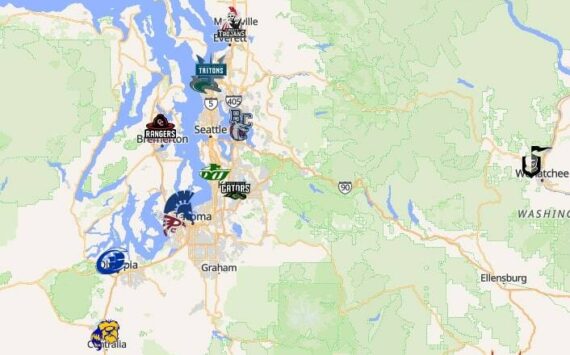Flatstick Pub, currently preparing to open its second location, tries to pull in customers with two amenities: mini-golf and local, independent beer.
During a recent tour of the soon-to-open Pioneer Square location (their other bar is in Kirkland), workers pounded furiously at shin-high apparatuses that would soon be carpeted with green plastic grass to beguile would-be putt-putt masters. Overlooking the operation was the bar’s pièce de résistance, a glowing, 10-foot Space Needle replica that will prove a central component to the final hole.
Involved as that all is, bar owner Sam Largent would suggest that beer is the trickier portion of the business.
To keep his 24 taps rotating with quality, independent beers, he pays two of his bartenders to work extra hours as “beer buyers”—good work if you can get it—who go out into the state’s exploding craft-beer community and seek the best of what’s brewing.
The result, as a glance at Flatstick’s tap list shows, is a lineup of ales and lagers from Pullman, Carson, Yakima, Vancouver, and of course Seattle.
“I like the local breweries,” the soft-spoken Largent reasons when explaining his approach to beer, “and the more you support it, the better beer you’re going to get.”
But along with the sheer labor of finding new beers and keeping the tap list fresh, working with small, independent brewers can mean forgoing certain perks that come with working with bigger players with deeper pockets. Early on, before they knew what Flatstick was all about, distributors with large brewers in their portfolio would come into the bar bearing gifts, Largent says.
“They’d offer us free stuff, beer signs, tickets to games,” he says. At one point, one distributor even offered to install the bar’s beer taps and lines at a heavy discount from what’s available on the open market, which Largent figures would have saved the bar $2,500 to $3,000. He says it wasn’t stated outright what would be expected in return for such largesse, but he knew from other bars’ experiences that it would set up an expectation that the distributor, not him, could determine what flowed through those beer lines. He passed on the offer.
The beer industry in Washington is extremely tightly regulated, sometimes to a baffling degree. Owing to a history that dates back to Prohibition and before, nearly every interaction between retailers, distributors, and brewers is codified in state law as either legal or illegal. For example, a brewer can give a bar enough T-shirts to outfit its staff as a promotion, but not so many that those shirts could be given to customers. The general intent of these laws, though, is fairly clear: The state does not want brewers or distributors to have too much sway over what beers a bar serves. Therefore a brewer or a distributor cannot give bars special perks, discounts, or cash, lest influence seep in.
Needless to say, offering to install a deeply discounted beer-line system is a violation of these laws. And yet stories like Largent’s are fairly commonplace in the Seattle beer scene, speaking to another truth: Beer-industry regulations in Washington are extremely loosely enforced.
This isn’t so much the fault of regulators but of a culture in which deals are literally made in dark bars between old friends, well out of sight of any kind of state agency.
“What’s difficult on the enforcement side is that there are often verbal contracts we don’t see. We’ll get complaints we’ll dig into, but then we need someone to testify,” says Jennifer Dzubay, a commander with the state Liquor and Cannabis Board, which regulates the beer industry. “We haven’t closed a lot of these cases. We can’t get the documents … or we don’t have the testimony.”
These beer laws—known generally as “trade practice” regulations—apply to all brewers, from nano- to macro-. And there’s little doubt that they are violated by the entire spectrum as well. As one craft brewer put it to me: “There’s probably not a brewer in this state that hasn’t been on the wrong side of the Liquor Control Board at some point or another.”
Yet on the whole, there is a general consensus that when laws are broken, Big Beer wins. With deep pockets, giant brewers like Anheuser-Busch In-Bev and MillerCoors, as well as the distributors they work with, have a clear advantage to buy influence over what beers bars, restaurants, and grocery stores serve.
A shining example of this came to light last week, when the LCB issued a $151,000 fine to AB In-Bev for exerting the very kind of influence over bars that the law is designed to prevent. According to the charges—which AB denies—the company used sponsorship dollars to essentially make the Showbox and Showbox SoDo sellers of AB beer exclusively.
No one familiar with Seattle’s beer industry thinks that AB is alone in the kinds of practices uncovered by LCB investigation. With more violations expected to be announced later this year, it’s possible that craft brands could be implicated in similar schemes. But the details revealed by the state, paired with AB’s growing influence over the distribution networks smaller breweries rely on to reach customers, do provide a clear picture of the kind of cutthroat deals that go into delivering a pint to your hands, often at the expense of small, independent producers.
For many beer enthusiasts, AB’s efforts are particularly insidious due to the way the company has essentially co-opted the craft-beer movement through purchases of beloved breweries like Seattle’s Elysian, Bend’s 10 Barrel, and Chicago’s Goose Island. This roster gives AB and its distributors the ability to outfit an entire tap lineup with its brands without the average customer realizing he or she is being offered only a single company’s beer. Indeed, on one night during the LCB investigation into AB, an agent counted 15 different beers for sale at the Showbox—every one either fully or partially owned by AB.
To some, parent ownership of breweries may seem academic or beside the point. But to others, it’s galling in a city that gave rise to a proud independent beer industry whose express purpose was to destroy the giant breweries that had been plying America with bad beer for so long.
Red Hook says as much in a radio spot now airing in the Seattle market, noting how the brewery started in an old transmission shop in Ballard to fight “mediocre beer.” What the ad fails to mention is that Red Hook is now 33 percent owned by AB.
The beer industry across the country operates under what’s called a “three-tier” system, in which different regulations pertain to three distinct players in the business: the person who makes the beer, the person who buys the beer wholesale, and the person who sells the beer to customers. If the system seems inefficient, that’s kind of the point.
At the end of Prohibition, state legislatures were essentially able to rebuild the alcohol industry from scratch. They sought to design a system that not only limited alcohol’s impact on society, but also increased fairness in the market. That included taking on the “tied houses” that had been a mainstay in the years prior to Prohibition—taverns in which only one brewer’s beer was sold. Lawmakers in the ’30s saw tied houses as anathema to fair competition, since they allowed large alcohol producers to control what consumers had access to.
“What was happening was … the largest distillers and the largest brewers in the country controlled all the saloons. There was no competition,” says Rick Garza, the director of the state Liquor and Cannabis Board.
The solution states came up with, in varying forms, was the ban on producers and distributors giving bar owners money or in-kind gifts.
Whether or not the system worked exactly as planned is debatable. During the middle of the 20th century, the American beer industry became less and less diverse as big breweries gobbled up smaller ones, resulting in less and less competition in the market. Consumers were left to lament that the U.S. market seemed doomed to be controlled by breweries that spent far more effort on clever marketing than on good beer. The year after Red Hook opened in 1982, 51 brewing companies in the U.S. were operating 80 breweries, according to Brewing in Seattle, a local history of beer-making.
By contrast, in Washington alone, there are now more than 220 microbreweries, 82 brewpubs, and five regional breweries, according to the Washington Brewers Guild. In 2014, 83 new breweries opened in the state. Across the country, at last count, 4,225 breweries were in operation.
Confronted with accusations that it is impeding craft brewing in the U.S. through anticompetitive business practices, AB In-Bev is quick to point out that such statistics suggest otherwise. Appearing before a Senate Judiciary Committee hearing, AB In-Bev CEO Carlos Brito called today’s beer market “perhaps the most competitive era in the history of the U.S. beer industry.”
To which small brewers might say, “Yes, but … ”
While it is true that today’s craft-beer market is robust, it is also true that AB controls about 45 percent of the entire U.S. beer market, MillerCoors another 26 percent. By comparison, craft-beer sales constitute 11 percent.
With this huge market share comes the ability to manipulate markets. AB has done this in part through the acquisitions of popular craft-beer brands. But more worrisome for small brewers, it has also begun to lean on distributors to favor sales of its beer over smaller producers or, in some cases, bought distributors outright.
The latter occurred in Seattle in 2012, when AB purchased K&L Distributors in Renton. Among the independent breweries K&L was serving at the time of the purchase was Iron Horse Brewery, out of Ellensburg.
Sitting in his office sporting a shirt that reads EFF YOU CRAFT, DRINK INDIE BEER—a reference to the feeling that big breweries have co-opted the “craft beer” label—Iron Horse owner Greg Parker says that when AB first bought the distributor, the new management said it would continue to push Iron Horse’s beer to clients.
“But it was just all talk and dead ends,” says Parker, who says his breweries’ sales in the Seattle area began to flatten. “It became clear they were sandbagging us.”
Parker even claims one of his employers was in a delivery van with a salesman from the AB distributor and overheard a manager scold him for selling Ninkasi IPA—an independent brewer out of Eugene—instead of Goose Island IPA, an AB-owned brand.
Nikos Ridge, CEO of Ninkasi, said via e-mail that he doesn’t doubt the story; Ninkasi saw their sales flatline after AB bought K&L, forcing Ninkasi to move to another distributor.
“You could [get a commitment] for Iron Horse and the next week you’ll have a Goose Island at the bar,” Parker says of his experience.
Parker says Iron Horse stayed with the distributor until 2014, but finally left for another, smaller company. While Parker says Iron Horse is happy with its new company, by being forced out of K&L, it and other craft brewers have moved from a distributor with a huge network to one with a much smaller footprint, which in turn means less access to bars and grocery stores.
Last October, the U.S. Justice Department opened an antitrust investigation into AB’s influence in the distribution market. The probe came after AB purchased five distributors in three Eastern states. It also caught the attention of Patrick Leahy, Vermont’s other populist U.S. senator, who oversaw a hearing in December to investigate antitrust claims. In his opening remarks, Leahy put the issue succinctly: “A product can only be sold if customers can find it. If craft brewers are being squeezed off the shelf because of restrictive behavior by the dominant companies, that harms competition and limits consumers’ options.”
Beyond antitrust issues, regulators are also increasingly concerned by what they see as less-transparent attempts by beer producers and distributors to sway what ends up getting poured at a bar. This is where the discount beer lines, free game tickets, and secret contracts come into play.
Garza, the LCB director, says he became increasingly concerned after hearing from officials in other states about “an escalation” in what they’d been seeing in the industry. After hearing what other states had uncovered, he says, he felt an imperative for his agency to look into complaints it had received.
“I can’t tell you that it hasn’t been there, but we’re enforcing more of it,” he says.
That’s what led investigators to uncover what Garza called an “egregious” violation of law, resulting in the $151,000 fine against AB.
The case began to come together last fall, when investigators started looking into a complaint that the Showbox and the Showbox SoDo, which at that time had food and drink services provided by Wolfgang Puck Catering, were serving only AB products. Investigators following up on the complaint documented that of 15 beers being served one night, all were either fully or partially owned by AB.
That in and of itself is not a violation of the law, but further investigation suggested that the two concert venues, along with Marymoor Park, had an exclusive contract with AB and its distributor. At one point a Showbox SoDo employee even told an undercover agent they wouldn’t sell Coors because of the agreement. That, the state argues, is a clear violation of the law.
(The complaint did not name the Showbox or Wolfgang Puck as parties to the case. In a statement e-mailed to Seattle Weekly, AB wrote, “AB does not agree with the allegations in the Notice. AB met with the state recently and will continue to respond to the Board in a timely manner.”)
Garza is quick to note that he doesn’t think bad behavior is exclusive to AB. “I think there’s more out there,” he says. “I don’t want to get lost in the ‘largest brewer in the world.’ What I worry about is a small brewer looking at the largest brewer in the world and saying, ‘If they’re doing it, maybe that would be OK for me to do.’ I don’t have any reason to believe that this is isolated to the largest suppliers or the largest distributors or the largest retailers.”
However, he also notes that in the end it will be the big brewers who win if regulation is lax. That’s because it will always be the bigger producers who have the capital to buy influence.
“The idea of locking out customers from being able to purchase that product because of the actions of a particular producer or manufacturer or distributors of alcohol is exactly why we have the prohibitions in the law,” says Garza. “When you look at Washington as one of the largest craft-brewing industries per capita … that growth is dependent on the fact that everyone is on a level playing field.”
In Ellensburg last week, Annie McGrath, the executive director of the Washington Brewers Guild, stood before a small group of brewers from central Washington and delivered a simple message: Follow the rules.
Despite the huge number of breweries in Washington, only 10 percent of the beer consumed in the state is produced by in-state craft breweries, McGrath told the crowd. That pales in comparison to AB’s share of the market. The upshot of the numbers: Don’t cheat and tear each other down; follow the rules and take down Big Beer.
“These laws were made to protect you,” she told the crowd. “When we do, it allows us to grow together.”
While some brewers who spoke to Seattle Weekly for this story expressed concern about Big Beer’s influence in the market, others expressed skepticism that the corporations will ever be able to stem the tide of craft brewing. Steve Luke, who founded Cloudburst Brewing after leaving Elysian following its sale to AB, says he has no doubt that AB would love to “kill” craft brewing, but that Seattle is somewhat immune to its influence. “Bars are more cognizant of the craft-beer scene.”
There’s also evidence that state regulations are having an effect. According to the LCB, the contract that had been in place between AB and the Showbox, Showbox SoDo, and Marymoor has been dissolved. It had been set to run until December.
Also, in early May, organizers at Marymoor sent an open letter to craft brewers in the area asking for submissions for beers to serve this summer.
Apparently, they have some open handles.








